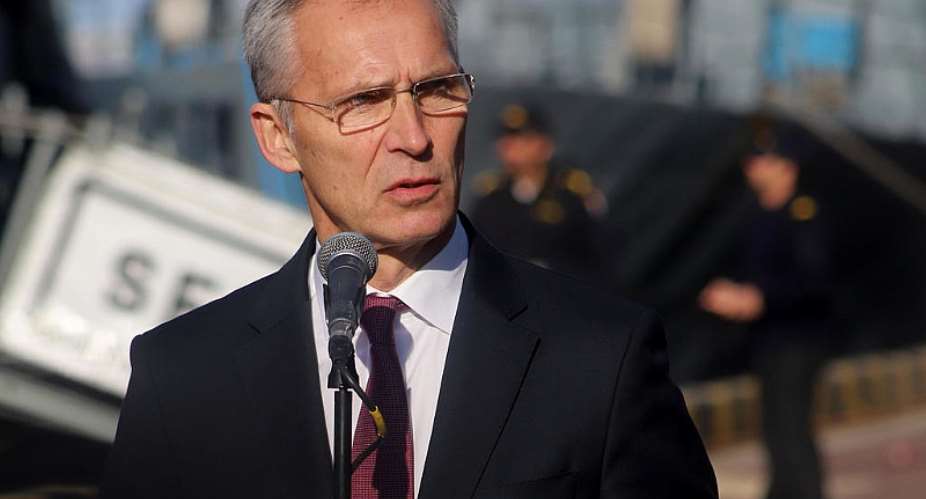French President Emmanuel Macron says he is “committed to a stronger European sovereignty” within the trans-Atlantic security alliance, which he once described as “brain-dead”.The remarks follow the publication of Nato's new strategy report, which sounds alarm bells on China's growing power.
In a telephone conversation with Nato's Secretary General Jens Stoltenberg, Macron “welcomed” Nato's “strategic thinking” outlined in the alliance's latest report published on 1 December.
The remarks stand sharp contrast to Macron's harsh appraisal of the Transatlantic Alliance, when he called Nato “Brain-dead” in an interview with British weekly The Economist on 7 November 2019. The French leader justified his comments by saying that, in his view, Nato “lacks coordination” in strategic decision making while one Nato member, Turkey, engages in “uncoordinated aggressive action”.
The alliance's latest report, “Nato 2030: United for a new era” followed the 2019 meeting of Nato heads of government in London and was put together by a group of experts led by former German Minister of Defence Thomas de Maizière.
Acute challenges
The 67-page report finds that although the alliance has answered adequately boosting military deterrence after the 2014 Russian annexation of Crimea and support to rebels in Eastern Ukraine, it warned that China “poses acute challenges to open and democratic societies.”
According to the report, “Nato allies feel China's influence more and more in every domain. Its Belt and Road, Polar Silk Road, and Cyber Silk Road have extended rapidly, and it is acquiring infrastructure across Europe with a potential bearing upon communications and interoperability,” and attributes instances of “cyber-attacks, intellectual property theft and the spread of disinformation” to China.
The report warns that Nato allies must guard against China exploiting “differences between the allies” and that the alliance must show “political cohesion.”
The report echoes the idea of China as “systemic rival” to western countries first put forward in the 2019 EU-China Strategic Outlook, which calls China “systemic rival promoting alternative models of governance.”
Chinese military might?
For now, China does not match Nato military might. According to global military watchdog Stockholm International Peace Research Institute (SIPRI), the US alone registered a 718 billion dollar military budget in 2020, while China, with a population four times larger, budgeted a 178 billion USD (1.3 trillion RMB)
The statistics do indicate that China's budget has been steadily rising since the year 2000, while Washington's budget decreased under the Obama administration, only to take off again after Trump came to power.
In terms of manpower, the US military employs 1,280,900 people, against 2,300,000 in China, but US aircraft, tanks and large navy ships still surpass China's hardware in quantity and quality, with the US having 20 aircraft carrier groups, ten times as much as the Chinese navy.
The ultimate weapon
When it comes to the “ultimate weapon,” the atomic bomb, the US outnumbers China by far as well. According to the overview of Sipri of world nuclear forces in 2020, the US has a total inventory of 5,800 nuclear warheads, of which 1,750 are actively deployed.
China has 320 nuclear warheads and the country “is in the middle of a significant modernization and expansion of its nuclear arsenal,” adding that “In 2019 the Chinese Government reaffirmed its commitment to 'a nuclear policy of no first use of nuclear weapons at any time and under any circumstances,” but Sipri noted a “shift towards more survivable mobile missiles.”
The 2019 report on China's military by the US Ministry of Defense estimated that China now deploys 90 Intercontinental Ballistic Missiles – capable of reaching the US and its allies.
To counter this, and the other perceived military and economic threats, Nato “must devote much more time, political resources and action to the security challenges posed by China,” according to the partnership's strategic outlook.





 Lay KPMG audit report on SML-GRA contract before Parliament – Isaac Adongo tells...
Lay KPMG audit report on SML-GRA contract before Parliament – Isaac Adongo tells...
 Supervisor remanded for stabbing businessman with broken bottle and screwdriver
Supervisor remanded for stabbing businessman with broken bottle and screwdriver
 NDC watching EC and NPP closely on Returning Officer recruitment — Omane Boamah
NDC watching EC and NPP closely on Returning Officer recruitment — Omane Boamah
 Your decision to contest for president again is pathetic – Annoh-Dompreh blasts ...
Your decision to contest for president again is pathetic – Annoh-Dompreh blasts ...
 Election 2024: Security agencies ready to keep peace and secure the country — IG...
Election 2024: Security agencies ready to keep peace and secure the country — IG...
 People no longer place value in public basic schools; new uniforms, painting wil...
People no longer place value in public basic schools; new uniforms, painting wil...
 'Comedian' Paul Adom Otchere needs help – Sulemana Braimah
'Comedian' Paul Adom Otchere needs help – Sulemana Braimah
 Ejisu by-election: Only 33% of voters can be swayed by inducement — Global InfoA...
Ejisu by-election: Only 33% of voters can be swayed by inducement — Global InfoA...
 Minority will expose the beneficial owners of SML, recover funds paid to company...
Minority will expose the beneficial owners of SML, recover funds paid to company...
 Prof. Opoku-Agyemang has ‘decapitated’ the NPP’s strategies; don’t take them ser...
Prof. Opoku-Agyemang has ‘decapitated’ the NPP’s strategies; don’t take them ser...
